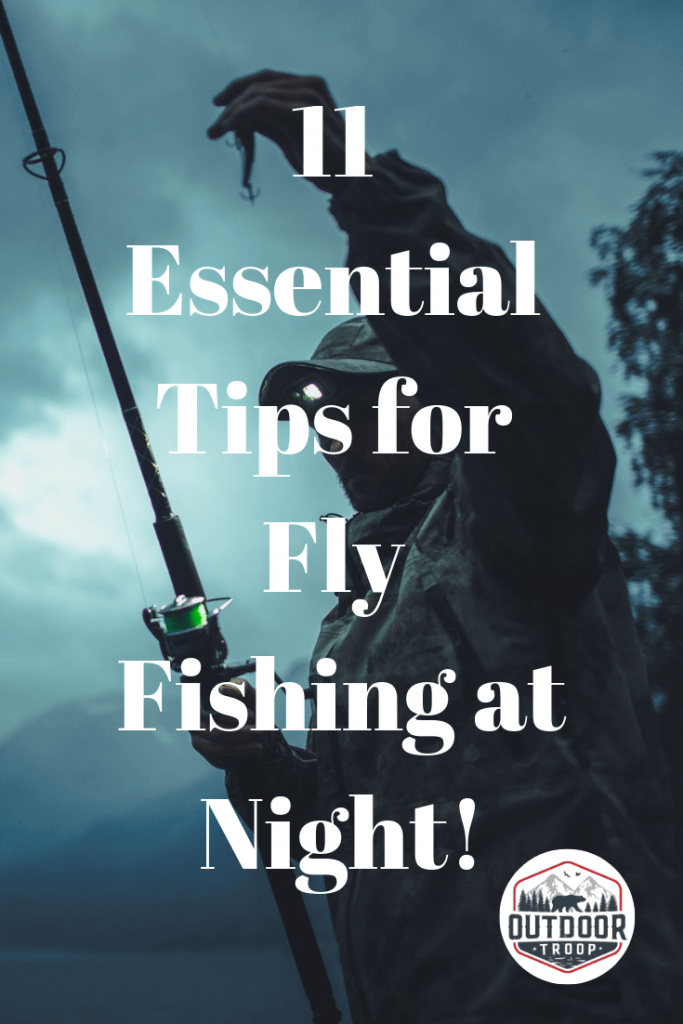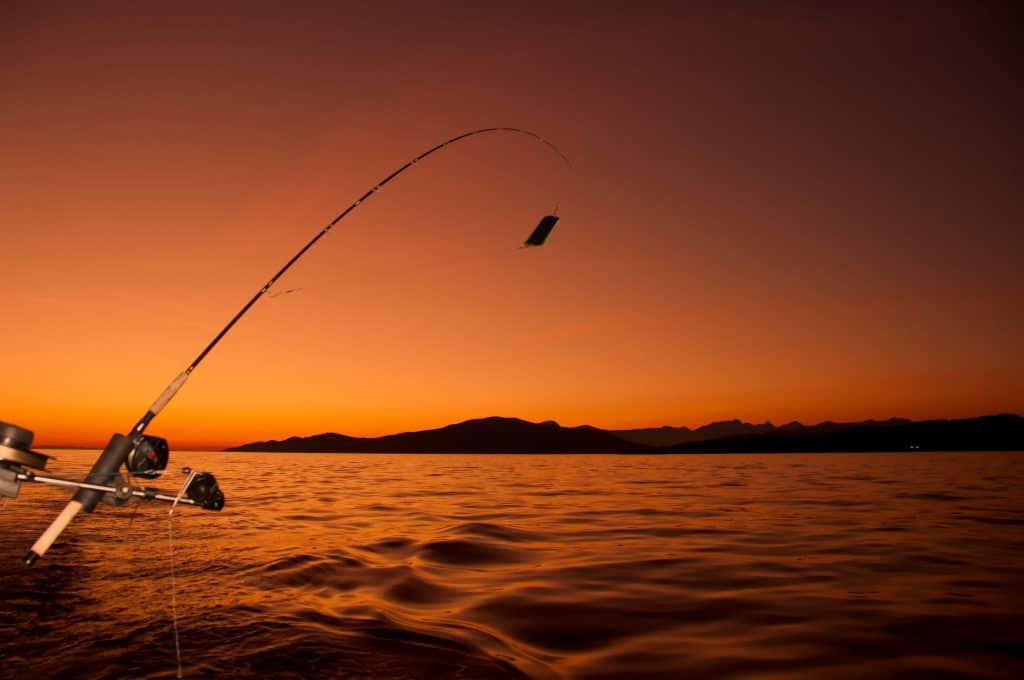
Fly fishing can be a great activity to do at night. The feeding fish are usually larger and less suspicious, you’ll be harder for them to see, and you definitely won’t have to worry about getting sunburned!
I wanted to put together a list of tips for those who are interested in fishing at night.
11 Tips for Night-time Fly Fishing:
- Know the Area
- Illuminate with Red Light
- Use Night Flies
- Use Large Lures
- Make Short Casts
- Use Glow in the Dark Line
- Be Obvious
- Protect Your Eyes
- Use a Heavier Rod
- Wear Safety Equipment
- Share Your Location
Applying these tips during your fly fishing nights can help you stay safe and get the most out of your night fishing experience! We’ll explore the purpose of each tip further down.
#1: Know the Area
No matter how good your flashlights and headlamps are, you won’t be able to see everything in and around you at night. If you’re unfamiliar with the river you want to fish, there could easily be some dangerous areas that you won’t notice until it’s too late.
Take some time to visit your chosen river in the daytime before you go at night. Wade around a bit and explore some places that you’re interested in targeting. Getting into the water during the day can also help you get a feel for the size and stability of the river rocks.
Try to gauge how stable the footing is and keep an eye out for sudden drop-offs, submerged logs, and other debris.
If it’ll help you remember, it might also be a good idea to take a few pictures of the river. You can refer to these when you go at night to remind yourself of any hidden dangers you may have spotted.
Another key to familiarizing yourself with the area is to only focus on a limited stretch of river. If you spread yourself too thin, there’s a higher chance that you’ll forget about some of the dangers you’ve seen or even get lost. Just stick to one general area and become familiar and comfortable with it.
When you’re actually out on the river at night, don’t stray too far from the areas that you know. Remember where you came in and how to get back to your car.
You can’t always rely on your phone for direction, so keeping a small compass or GPS with you can help you find your way if you get lost.
#2: Illuminate with Red Light
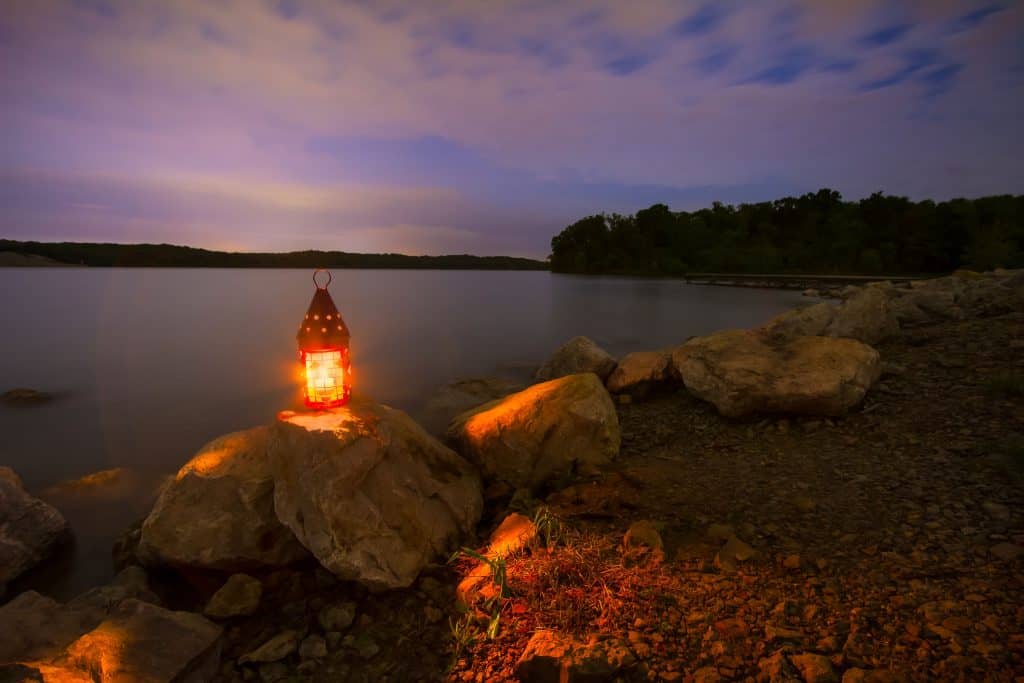
No matter how well you remember the layout of a river, you’re still going to want to bring a light of some kind during night fishing. Flashlights are an option to look into, but they can be awkward to handle when you’re wading through a dark river.
Headlamps are usually the easiest form of light to bring with you, since they’re hands-free and will direct the path of the light toward where you’re looking.
When you’re choosing your light, you’ll want to use equipment that gives off a red light. If you use gear that shines with a bright white light, it can glare off the water and possibly give you flash blindness.
Flash blindness is what happens when someone drives toward you on the highway with their headlights turned all the way up. It’s temporary, but it can dazzle your eyes and make it hard to see where you’re going for a bit. It’s not fun, so don’t do it to yourself!
Red light is much easier on your eyes, and it’s also harder for the fish to see as well! Water naturally filters out warmer hues of light such as yellow, orange, and red, so they won’t be able to see a red light as easily as a white one.
#3: Use Night Flies
If you’re using flies instead of bait at night, you’ll need to choose lures that fish would be interested in during the dark hours. There are some kinds of insects that just won’t be out and about at night, so they’re not on the menu.
Unfortunately, this means that even your reliable daytime lures might not get the attention that they usually do. Be sure to select lures that fish will be able to see and recognize under the cover of darkness.
This will be especially important if you’re interested in using dry flies. Fish won’t be able to see surface level food quite as well, so your lures will need to look very realistic to stand out from floating debris.
Some of the best dry flies to use at night would be the Hexagenia, the “Zoo Cougar” and the White Wulff. These have all proven themselves as reliable dry flies for several fishermen in the past. Other good lures will vary depending on your area and the season of the year.
If you go night fishing frequently, you can work on building a good collection of lures for the daytime and nighttime.
#4: Use Large Lures
If you’re not interested in using dry flies, that’s fine too! Many fish who are night feeders actually prefer to go after prey that lives underwater. They might be interested if they see a bug on the surface of the water, but they’re far more likely to go after large, wet lures and streamers.
Many fish who feed actively during the night are bigger than their daytime counterparts. They require more food and will be able to handle larger prey than the average fish.
This also means that they won’t be very picky about what it is they’re eating. If they see something drifting toward, them, chances are good that they’ll go for it!
The larger the lure, the more likely it is to grab their attention. Patterning your flies after small fish, crayfish, or even mice can be hugely effective at night.
#5: Make Short Casts
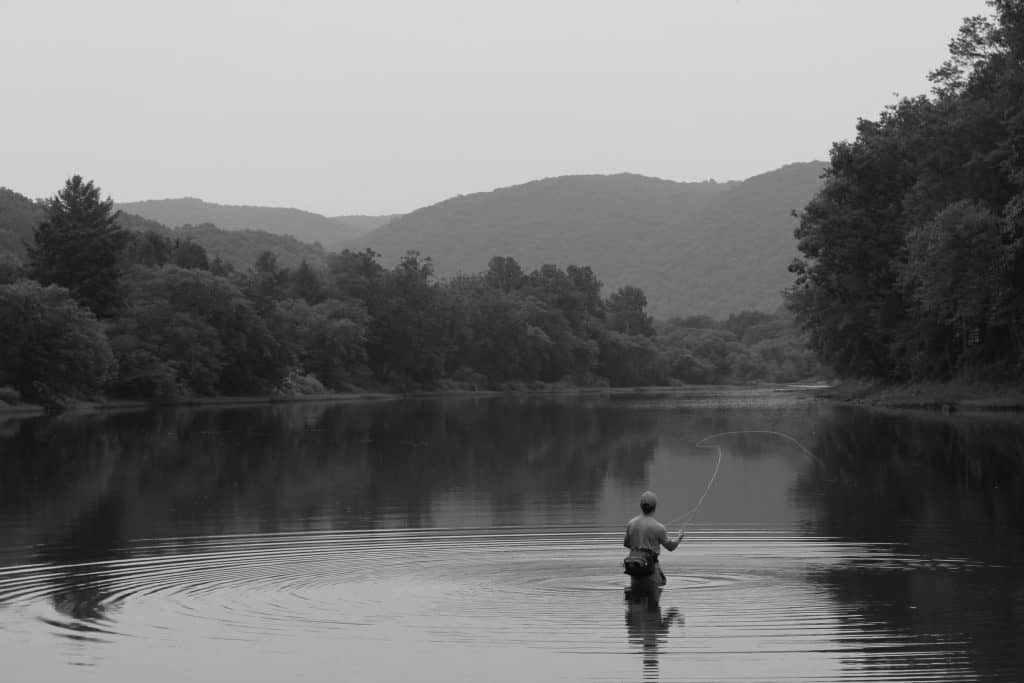
A casting technique that will save you time and energy while night fishing is to make short, direct casts. This will mean that you also have to cast more often, but your success rate is likely to be higher.
Due to the lack of light, fish won’t be able to see your fly approaching from a distance. They expect to see food at the last minute and will snap at it at the first opportunity. Using long, drawn-out approach strategies will just waste your effort.
During darkness, fish will also be less aware of your presence and you’ll be able to get closer to them. Use this to your advantage and aim directly for the specific area that you want.
Don’t invest in a big leadup because the fish won’t be able to tell the difference. You can afford to be less sneaky during the night.
Making more direct casts can also lower the chances of your line catching on rocks, logs, or other debris. Snags are never fun to deal with, and even less so at night!
#6: Use Glow in the Dark Line
If you plan on doing a lot of night fishing, one product that can be well worth the money is a glow in the dark fishing line. It’s hard to track where your fly is in the best of conditions and can be nearly impossible under the cover of darkness.
Glowing fishing line will make it easier for you to track the flow of your cast and make sure it’s going where you want it to. You’ll also be able to see it if it catches on something. Snags are much easier to see and untangle with a glowing line.
Glow in the dark fishing line might seem strange and unnecessary, but it can be hugely useful! Anyone who plans on night fishing regularly will want to consider this piece of equipment.
It’s easier to keep track of, and as long as you charge it up next to a bright light source, it can also last for a good amount of time.
If you’re not interested in setting your whole fishing line ablaze, then there’s also the option of buying glowing indicators for your flies. You’ll still be able to keep track of your lure, though the line itself might still be a bit hard to see.
Both of these will make your night fishing experience much easier.
Depending on how often you plan on fishing at night, it’ll be up to you to decide which of these is worth the price.
#7: Be Obvious
One of the attractions of fly fishing in the daytime is that you can cast your line and just let the lure float down the river. It’s fairly low effort and it mimics the behavior of many surface-level insects. However, this strategy is far less likely to work at night.
As mentioned above, fish usually won’t be able to see things that are just drifting by when it’s dark out. Things that move, twitch, and struggle are far more likely to catch their attention.
Disturbing the water can actually be used to your advantage at night! Fish will be able to tell if something is splashing around and they’ll be more drawn to it. Don’t be afraid to land flies heavily into the water and jerk your line around.
Although subtlety is ideal during the day, you’ll want to be obvious at night.
#8: Protect Your Eyes
This might seem like strange advice for night fishing. Surely you’ve heard that wearing sunglasses during the day will protect your eyes from glare and UV radiation.
However, your eyes need a different kind of protection during the night. Sun isn’t the issue this time, but loose equipment and stray fishing hooks.
Since you won’t be able to see what you’re doing as well, it’s easy to lose track of your hook as you swing it back and forth. Catching yourself in the eye with a loose cast will bring any trip to an unpleasant end.
Even though you don’t need to worry about the sun, you still need to protect your eyes. While you’re at it, the rest of your body could do with some protection too! Covering your arms, neck, and head with long clothes or a hat can help prevent scrapes, cuts, or other surface level injuries.
#9: Use a Heavier Rod
Most fly lures that you would use during the day are quite light and delicate. The fly itself is supposed to weigh next to nothing and the weight of the fishing line will propel the cast.
But if you’re using large, heavy, obvious flies at night, you’ll want a solid rod to compensate for that. The fly rods you’ll want to use at night are those that are shorter, thicker, and heavier than average. They also don’t need to be as long as most other rods, since your casts will be shorter and more direct.
The thickness of the rod can also counterbalance the heavier flies and line to make it easier to reel fish in. The fish who bite at night are generally larger and stronger than the average daytime catch. You’ll need the extra weight and strength of the rod to counter that!
7-weight rods are best for small to medium sized fish, but 8-9 weight fishing rods are best if you’re interested in using large flies and going after especially big fish.
#10: Wear Safety Equipment
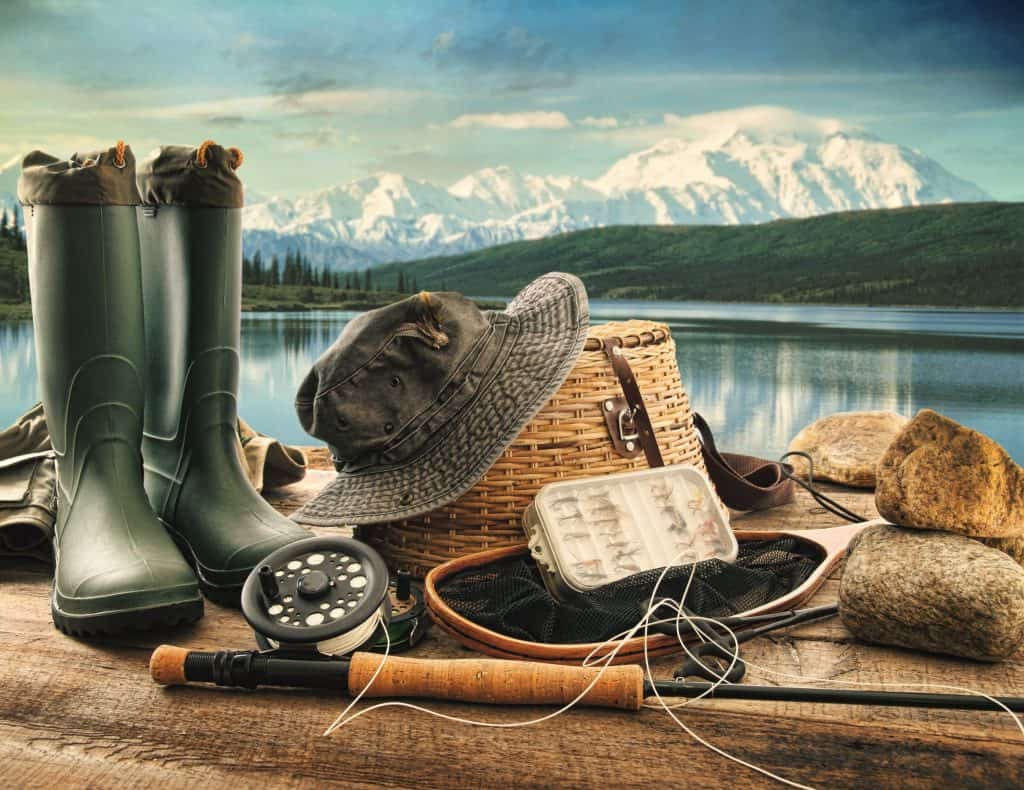
Any outdoor activity carries some inherent risks to it. But wading around dark rivers at night, carrying lots of gear and dealing with uneven footing is especially dangerous.
To protect yourself, you’ll want to take some precautions and invest in some good safety equipment. To help you keep a stable center of balance, you can purchase and attach studs to the bottoms of your wading boots.
In addition, you’ll also want to bring a small portable first aid kit in case anything does happen. Having basic equipment like bandages on hand can come in handy for a variety of small injuries. This is a backup that you won’t want to be caught without!
It’s also more cold at night, so wear long sleeves and other warm clothes. These will keep you warm, and also protect your skin from being hooked by a stray cast. Bring an extra set of warm, dry clothes in your car as well.
If you do happen to fall in the river, these can help you fight off hypothermia. Plus it’s much more comfortable and convenient than driving home in soaking clothes!
And finally, you’ll want to bring something to ward off wild animals. Bears will frequently go for fish, so you always need to be prepared to run across them or any other kind of predator.
Bear spray is a popular bear deterrent that can be purchased in portable, aerosol dispensers.
Ideally, you won’t need any of this equipment, but fly fishing at night does carry some risks. It’s always best to take precautions beforehand and be prepared.
#11: Share Your Location
As with any potentially dangerous activity, you want people to know where they can find you if something goes wrong. If possible, it’s a good idea to bring someone with you during night trips.
You’ll be able to keep track of each other and help each other out in the event of an accident.
If you do want to go alone though, make sure you leave details about where you’ll be and when you expect to be done. If something does go wrong, people need to know where to look for you.
If the area you visit has cell phone service, you could also drop a GPS pin when you arrive. If you send this information out, those you contact will be able to pinpoint your location and send help if it’s needed.
Keep in contact with your outside network if possible. Send updates when you arrive, before you make any major moves, and when you get ready to leave. If an accident occurs along the way, outside help can trace these updates to find you more quickly.
Related Questions
Is fishing easier at night? Night fishing can be more productive than fishing during the day. There is often less competition, larger fish will be feeding, and they will be less suspicious and observant. It’s also easier to get closer to fish in low light conditions.
Do wet flies or dry flies work best at night? Both wet and dry flies can be used during the night time, but wet flies are usually more successful. They are often larger and more obvious and their disturbance of the water makes them easier for fish to target.
Can trout see at night? Trout can see at night, but they won’t be able to distinguish between different colors. Most fish can see in color, but they will only see black and white in areas that are dim or dark. They will be able to see food or lures that pass by, but artificial lights will be less noticeable.

